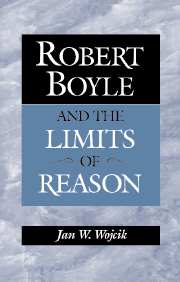Book contents
- Frontmatter
- Contents
- Preface
- Acknowledgments
- Introduction
- Part I The Theological Context
- Part II The Context of Natural Philosophy
- 5 Philosophies of Nature and their Theological Implications
- 6 Sources of Knowledge
- 7 The Limits of Reason and Knowledge of Nature
- 8 Boyle's Voluntarism and the Limits of Reason
- Conclusion
- Bibliography
- Index
7 - The Limits of Reason and Knowledge of Nature
Published online by Cambridge University Press: 24 November 2009
- Frontmatter
- Contents
- Preface
- Acknowledgments
- Introduction
- Part I The Theological Context
- Part II The Context of Natural Philosophy
- 5 Philosophies of Nature and their Theological Implications
- 6 Sources of Knowledge
- 7 The Limits of Reason and Knowledge of Nature
- 8 Boyle's Voluntarism and the Limits of Reason
- Conclusion
- Bibliography
- Index
Summary
I have argued that Boyle's primary motivation for writing Discourse of Things above Reason was a theological one, and the work was in fact considered to be a theological work at the time. It was listed as a theological work in catalogues issued by his publishers in his later years, as well as classified as theological by subsequent compilers of collections of his works. Nevertheless, Boyle explicitly presented the work as a philosophical essay, not a theological one, claiming that the category of things transcending reason is not limited to revealed truths but extends to matters of natural philosophy as well.
Boyle's position here was certainly not original; as I pointed out in chapter i, it can be traced back at least as far as Irenaeus (born c. 126) who, arguing in a theological context not unlike that which prompted Boyle's Things above Reason, supported his claim that certain Christian doctrines are genuinely mysterious by pointing out that some natural phenomena are also mysterious. As Étienne Gilson has put it, this “insistence on the deficiency of natural knowledge introduced, if not for the first time, at least with a force that was then new, what will remain, up to the time of Montaigne's Apology for Raymond Sebond, the favorite theme of a certain type of Christian apologetics.” The deficiency of natural knowledge was certainly a favorite theme of Boyle's a hundred years after the publication of Montaigne's Apology in 1568. In the hands of one of the founders and foremost members of the Royal Society of England, it took on a new significance, and received an application that helped define the limits of the new natural philosophy.
- Type
- Chapter
- Information
- Robert Boyle and the Limits of Reason , pp. 151 - 188Publisher: Cambridge University PressPrint publication year: 1997



